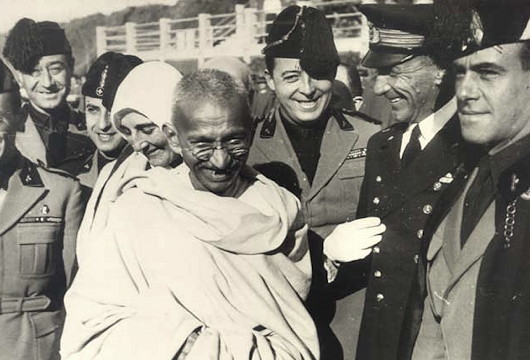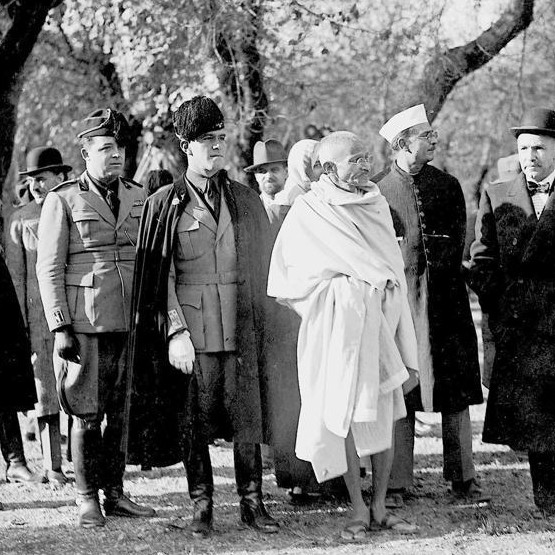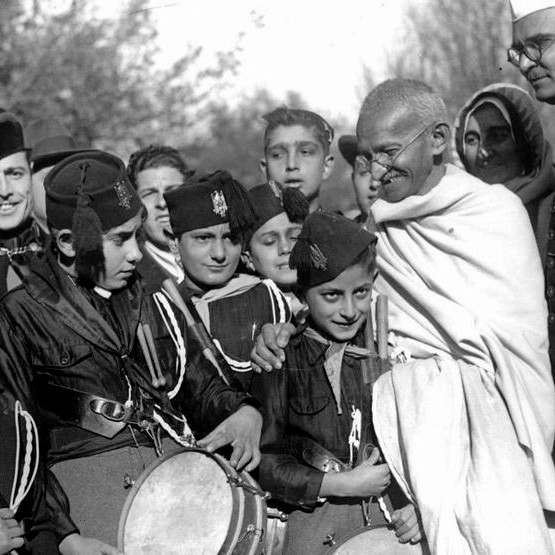
About Andrew Cusack
 Writer, web designer, etc.; born in New York; educated in Argentina, Scotland, and South Africa; now based in London.
Writer, web designer, etc.; born in New York; educated in Argentina, Scotland, and South Africa; now based in London. read more
News
Blogs
Reviews & Periodicals
Arts & Design
World
France
Mitteleuropa
Knickerbockers
Argentina
The Levant
Africa
Cape of Good Hope
Netherlands
Scandinavia
Québec
India
Muscovy
Germany
Academica

Gandhi in Fascist Rome
Returning home to India from the second London Round Table Conference in 1931, the genial Indian nationalist leader Mr Gandhi decided to call in on that most ancient, venerable, and eternal city of Rome. He accepted the invitation to stay as a guest of the aviation pioneer (and later fascist senator) General Maurizio Moris and, purporting to be of something of a spiritual aficianado, hoped to be granted an audience with the Holy Father. Gandhi had by then adopted an unwavering costume of sandals and homespun which was thought unsuitable for the papal court, and Pius XI — in many ways a wise man — decided against the Indian’s request. Mussolini, however, was less fussy and granted the “Mahatma” a private audience on the very evening of his arrival.
In some ways they were similar: Gandhi and Mussolini shared a gift for the theatrical as well as an unshakeable self-belief. Mussolini fancied himself the leader of his people, despite the King above him, and Gandhi thought likewise of himself despite the entire apparatus of the Raj standing apart from and above him. Gandhi, however, never stooped to the level of the buffoon, unlike his Italian friend, and (even after independence) wisely abjured himself from ever taking on the actual responsibilities of government and state office.

In a letter to Romain Rolland, Gandhi wrote of his reception in the Eternal City:
Mussolini is an enigma for me. Many of the reforms he has made attract me. He seems to have done a great deal for the peasantry. Of course the iron glove is there. But allowing that force is the basis of Western society, Mussolini’s reforms deserve an impartial study. His care for the poor people, his opposition to over urbanisation, his attempt to bring about coordination between capital and labour seem to me to demand very careful attention. … I must say that he was charming with me.
Before setting sail from Brindisi, India’s famous pacifist accompanied local fascist and state officials in reviewing the young Italian naval cadets, telling the newsreel reporters, “It gives me very great pleasure to see all these young children hale and hearty.”
Gandhi returned to India hailing Signor Mussolini as “one of the great statesmen of our time”, to the infuriation of many among his smart set of bien pensant sympathisers across Europe. Doubtless his opinion would have been revised after Italy’s unprovoked invasion of the ancient empire of Ethiopia five years later but by that time Indian domestic politics held his attention instead.

Search
Instagram: @andcusack
Click here for my Instagram photos.Most Recent Posts
- Silver Jubilee November 21, 2024
- Articles of Note: 11 November 2024 November 11, 2024
- Why do you read? November 5, 2024
- India November 4, 2024
- The Lithe Efficiency of the Old Constitution November 4, 2024
Most Recent Comments
Book Wishlist
Monthly Archives
Categories



Musso’s mistake was to declare war on France in 1940. Had he, like Franco, remained neutral during the war then he, again like Franco, would have died in his bad and still in charge.
I agree that Pope Pius XI was wise to decline the meeting request. However, rejecting Gandhi because of his clothing and sandals is absurd. What did St. Francis of Assisi wear? Why are Discalced Carmelites called “discalced”?